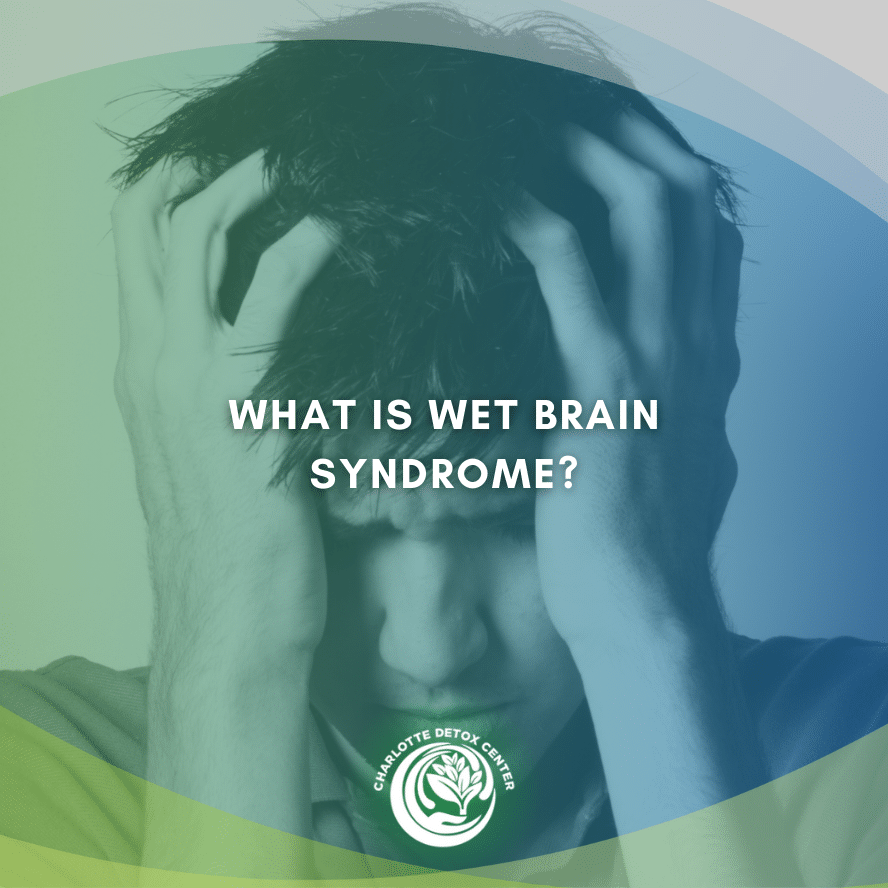What is Wet Brain Syndrome?

Medically Verified: 2/1/24
Medical Reviewer
Chief Editor

All of the information on this page has been reviewed and verified by a certified addiction professional.
Alcoholism is a common problem in the United States, with 14.1 million adults suffering from an alcohol use disorder in 2019.[1] When you are struggling with alcoholism, drinking alcohol becomes more important than everything else. This can lead to an array of consequences, such as financial distress, social isolation, increased mental health issues, and a myriad of health conditions.
One of the risks of long-term alcohol abuse is the development of brain disorders. Alcohol affects the central nervous system of your brain, causing damage when the substance is misused. While most people associate liver damage with alcoholism, this condition can also cause a brain disorder known as wet brain syndrome.
Wet brain syndrome or Wernicke-Korsakoff syndrome (WKS) is a potentially life-threatening condition caused by long-term alcohol addiction. Understanding what this condition is and how it develops may motivate you to find the help you need before it’s too late.
Understanding Wet Brain Syndrome
Wet brain syndrome is the unofficial term for two related medical conditions: Wernicke’s Encephalopathy and Korsakoff’s Psychosis. These conditions often occur together, with Wernicke’s Encephalopathy leading to the development of Korsakoff’s Psychosis. Once you have developed Korsakoff’s Psychosis after having Wernicke’s Encephalopathy, you will be diagnosed with Wernicke-Korsakoff Syndrome (WKS).
Both of these brain disorders are caused by a vitamin B1 deficiency and damage to the brain stem from heavy and long-term alcohol abuse. When you develop Wernicke’s Encephalopathy, the condition causes damage to the hypothalamus and thalamus of the brain. This damage leads to the development of Korsakoff’s Psychosis, causing an array of distressing psychological symptoms that may be permanent.
What Causes Wet Brain?
Wet brain syndrome affects between 1 and 2% of the U.S. population.[2] Excessive abuse of alcohol over a long period can lead to the development of brain disorders like WKS. People develop this condition because of a variety of factors that are all related to heavy alcohol abuse.
When you have an alcohol use disorder, your nutritional needs are never your first priority, and many people with alcoholism deal with nutritional deficiencies. Some people begin to lack vitamin B1 and alcohol damages tissue in your digestional tract, preventing your body from being able to absorb this essential nutrient.
Long-term alcoholism can also cause you to develop other conditions like cancer, HIV/AIDS, heart failure, and long-term dialysis. All of these illnesses cause a vitamin B1 deficiency which is the main cause of wet brain syndrome.[2]
Lastly, when you are constantly drinking in excess it is common to experience frequent episodes of nausea and vomiting. When you are constantly vomiting, your body can become depleted of certain nutrients, like vitamin B1. This is one of the many ways that long-term alcohol abuse contributes to the development of Wernicke-Korsakoff’s syndrome.
The Symptoms of Wet Brain Syndrome
Wet brain syndrome occurs in two phases. First, you develop Wernicke’s Encephalopathy. Unfortunately, 80-90% of people who suffer from this disorder end up developing Korsakoff’s Psychosis.[3]
The symptoms of Wernicke’s Encephalopathy include:
- Twitching
- Confusion
- Short-term memory issues
- Poor reflexes
- Uncontrollable or unusual eye movements
- Poor muscle coordination
- Loss of balance
- Blurred vision
- Drooping eyelids
- Increased heart rate
- Weakness and muscle atrophy
- Low body temperature
- Mental processing issues
Oftentimes, the symptoms of Wernicke’s Encephalopathy are confused with signs of alcohol intoxication. This is unfortunate, as early diagnosis and treatment can prevent the development of Korsakoff’s Psychosis. According to the National Institute of Neurological Disorders and Stroke, “Korsakoff’s syndrome damages nerve cells and supporting cells in the brain and spinal cord, as well as the part of the brain involved with memory.”[4]
The symptoms of Korsakoff’s Psychosis include:
- An inability to form new memories
- Severe loss of memory
- Making up stories (confabulation)
- Seeing or hearing things that are not there (hallucinations)
- Anger and frustration
- Personality changes
- Increased talkativeness
- Coma
It is important to note that you can treat Wernicke’s Encephalopathy and prevent it from leading to Korsakoff’s Psychosis. If you stop drinking alcohol, eat a healthy diet, and receive vitamin B1 transfusions, you can prevent further nerve and brain damage from occurring. This is why it’s so important to receive treatment from a drug and alcohol rehab program.
Unfortunately, once you develop Korsakoff’s Psychosis stage of wet brain syndrome, the damage is usually irreversible. You can receive treatment and learn how to manage your symptoms, but any improvement in memory function is slow or incomplete.
Find Help for Alcohol Abuse and Addiction Today
If you or a loved one suffer from an alcohol use disorder, professional alcohol rehab is required. The earlier you stop drinking, the less likely you are to experience the long-term effects of alcohol abuse.
Our clinical team at Charlotte Detox Center is here to meet all of your detox needs. We offer individualized treatment plans and a small patient-to-staff ratio to ensure that each person in our care receives the best possible support. With teams made up of clinicians, doctors, counselors, and recovery coaches, we will be with you every step of the way – starting with alcohol detox.
Detoxing from alcohol isn’t easy, but you don’t have to go at it alone. If you or a loved one is suffering from alcohol abuse, contact us today.
References:
